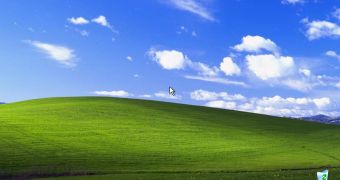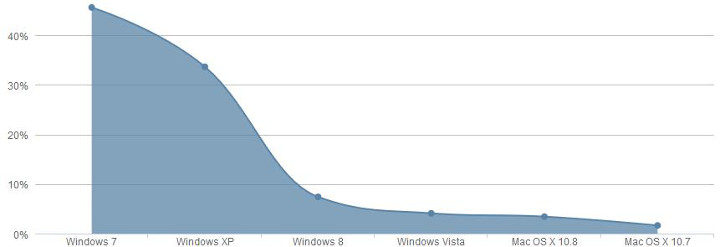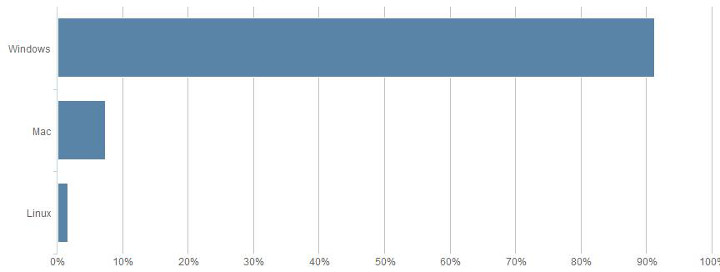Moving users away from Windows XP is Microsoft’s biggest challenge these days, as the operating system will be officially retired on April 8, 2014.
Statistics provided by market researcher Net Applications for the month of August 2013 reveal that users finally seem to get Microsoft’s message, so the soon-to-be 12-year-old platform is quickly losing ground.
At this point, Windows XP is still powering 33.66 percent of computers worldwide, down nearly 4 percent versus the month before.
While this difference might seem a bit insignificant at the first sight, it’s actually the biggest drop in market share Windows XP has recorded in the last 12 months.
Back in October 2012, XP had a share of 40.66 percent, declining gradually to 37.19 percent in July 2013.
Even though Windows XP is clearly going down, its current market share is enough to remain the second most popular operating system in the world, after Windows 7 and its 45.63 score. Windows 8 is third right now with 7.41 percent, followed by Vista with 4.11 percent.
In addition, XP is one of the key factors behind Windows’ 91.19 percent desktop operating system market share. Of course, this makes it number one, ahead of Mac and Linux, which are now powering 7.28 and 1.52 percent of computers worldwide, respectively.
What it means for Microsoft
Given the fact that Windows XP is now losing users, Microsoft can now put the focus on Windows 8 and 8.1, as the company still struggles to boost the market share of its new and modern operating system.
Windows XP was clearly one of the products that slowed down Windows 8’s adoption, as many users decided to stick to the aging platform than to switch to a significantly changed operating system that was criticized by consumers and analysts alike.
At the same time, the Windows XP retirement seriously affected Microsoft’s image, as plenty of people around the world blasted Redmond for its decision to discontinue one of the top operating systems out there. The company, on the other hand, indicated that Windows XP no longer supported newer technology, so the switch to new systems was absolutely necessary.
What's more, Microsoft has always pointed to the overall security of Windows XP, explaining that both Windows 7 and Windows 8 are much better when it comes to keeping users and their data on the safe side.
What it means for users
Basically, moving from Windows XP to a newer platform means enhanced security. With Microsoft no longer releasing support and patches for the operating system, users are left all alone in their attempt to remain protected while browsing the web or using specific app.
Depending on their next destination, users might very well need additional training, as Windows 8 has often been described as a rather confusing operating system that lowers productivity and needs additional costs.
The lack of a Start button, the Metro UI that’s more appropriate for a touch-capable device, and the flat design are some of the most controversial products included in Windows 8, so the slow adoption isn’t at all surprising for Microsoft’s latest OS.
At the same time, moving to a newer platform could also require upgraded hardware, so the transition from Windows XP to a different version of Windows has been considered a pretty expensive process.
Windows continues to be the dominating desktop OS on the market, while both Mac and Linux are way behind, statistics provided for the month of August 2013 show.
 14 DAY TRIAL //
14 DAY TRIAL // 
